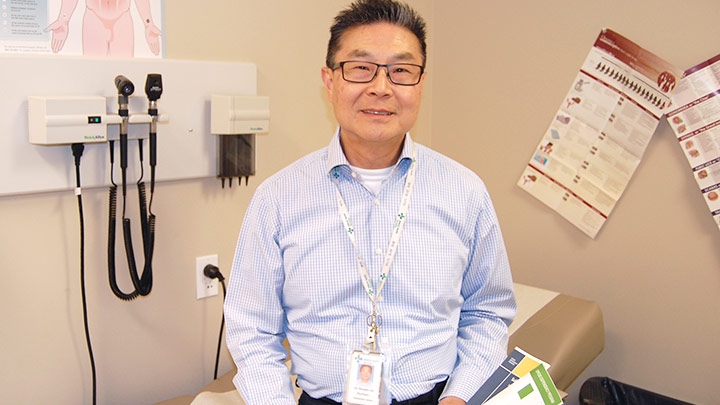
July 25, 2017

Dr. Ronald Lim, Medical Lead for AHS Calgary Opioid Dependency Program, is one of the opioid experts who will be on-call for telephone consultation with primary care physicians seeking guidance on caring for their patients with opioid dependencies..
Story by Colin Zak
Primary care physicians and nurse practitioners (NPs) caring for patients with opioid dependency will soon have access to expert consultation with a specialist over the phone.
Beginning Aug. 8, physicians and prescribers in Alberta can consult with an opioid dependence specialist on call for advice regarding prescribing drugs like buprenorphine/naloxone (Suboxone), methadone or naloxone, as well as treating patients with existing opioid dependency.
“Primary care physicians without experience treating this group of patients often face challenges and require additional guidance. As a result, patients are typically referred to Emergency Departments or special clinics, rather than receiving care with their family doctor,” says Dr. Michael Trew, Medical Lead, Addiction and Mental Health Special Projects with Alberta Health Services (AHS).
“This is great news not only for physicians, but also patients with opiate dependency.”
This consultation service will be piloted for seven months through February 2018 and will be operated by Referral, Access, Advice, Placement, Information & Destination (RAAPID). Callers will receive a follow-up call as soon as possible from one of the four physicians working at the Edmonton and Calgary Opioid Dependency Program clinics.
“This resource means patients with opioid use disorder will be able to attend their community physician’s office for opioid use disorder management, which will improve access for opioid agonist therapy and overall care because they can have all their co-occurring medical problems managed in one site,” explains Dr. Ronald Lim, Medical Lead for AHS Calgary Opioid Dependency Program.
Opioid dependence is a growing clinical and public health problem, particularly in Alberta. The United Nations indicates that Canada is the leading per capita user of prescription opioids in the world and that rates of addiction and overdose are correspondingly high. Opioids include traditional opiates such as heroin, morphine, fentanyl and oxycodone, along with synthetic opiates such as methadone.
To help manage the needs of this growing patient population, AHS has teamed up with Alberta Health and the College of Physicians and Surgeons of Alberta (CPSA) and the College of Family Physicians Canada (CFPC) to increase the number of community-based primary care physicians who are trained to prescribe Opiate Agonist Therapy and to manage the care of their patients with this dependency.
Opiate Agonist Therapy refers to the treatment of addiction to opioid drugs; an agonist is a drug that activates certain receptors in the brain.
“Individuals battling the stigma and chaos of Opioid Use Disorder are in danger of significant health decline and even death. Combined with common diagnoses of mental illness, complex chronic diseases and trauma, we as Primary Care Providers have a vital role in helping to diagnose individuals and get them on life-saving, evidence-based treatment,” says Dr. Van Nguyen, Health Director of Calgary Urban Projects Society (CUPS).
Dr. Bonnie Larson, a CUPS family physician, agrees.
“With the right preparation and supports, opioid use disorder can be as straightforward to treat as other chronic diseases such as diabetes or hypertension. The outcomes can be dramatic, with individuals moving from chaos to stability, illness to health, quite quickly,” says Larson. “It is an extremely rewarding aspect of my practice.”
“In working with our community partners, we have the opportunity to work closely with patients in a supportive, non-judgmental manner that helps them to stabilize and improve their lives,” Dr. Larson adds.
Physicians north of Red Deer can access the service by calling RAAPID North at 1-800-282-9911 or 1-780-735-0400. Physicians in and south of Red Deer can call RAAPID South at 1-800-661-1700 or 403-944-4488.
For more information, please visit ahs.ca/opioidadvice.